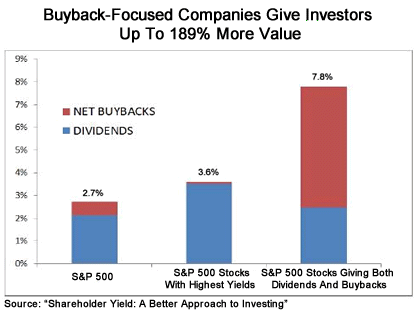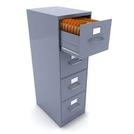|
Why Buffett And Other Billionaires Are Opting For "Tax-Free Dividends"
By Elliott Gue August 30, 2013 They're on fire this year. Top companies are giving out a special type of "dividend" to give shareholders more bang for their investment buck. They are a favorite of Warren Buffett and many other billionaire investors. They work like traditional dividends, but with one major difference -- they are completely tax free. There's a good chance you've received one of these "tax-free dividends" before and didn't even realize it. That's because companies don't issue them in the normal way. Sponsor The Only Investment Strategy You'll Ever Need One study showed this type of strategy "generated the greatest average annual return for investors since 2000." Another one of 38 years determined returns "would have been five times greater than the buy-and-hold strategy." This really could be the only kind of strategy you ever need. Go here to see how much it could make you. In case you haven't guessed by now, I'm actually talking about companies buying back shares of their own stock. I like to think of these share buybacks as "tax-free dividends" -- ones that can give you much more value than traditional dividends, as I'll show you in a moment. In the past 12 months, the 1,000 largest U.S. companies -- as represented by the Russell 1000 Index -- have bought back a stunning $455 billion of their own shares. That's up 32% from the prior 12-month period. In fact, if you go back to 2009, companies have spent $1.4 trillion buying back their own stock. So how does this reward investors? Think back to Econ 101. The payoff is largely a function of the law of supply and demand. When a company buys back its own stock, it effectively reduces the pool of shares available to anyone else. And in turn, it makes the shares still out there on the market that much more valuable. So if you own a stock and the company executes a buyback, that increase in value is like getting a tax-free dividend. Think of it in terms of your share of a company's earnings. If you own 10% of a company that earned $1,000, your share of earnings would be $100. But if that company bought back half of its stock, your portion of the earnings would double to $200. And that's without you having invested another dime. How can companies afford to buy back so much of their own stock? At the end of last year, U.S. corporations were holding nearly $1.8 trillion in cash, a figure that has grown by 70% in the past 10 years. One contributing factor that is keeping money in U.S. corporate pockets: Companies have been reluctant to dole out money on major acquisitions. In fact, mergers and acquisitions, or M&A activity, has hit a three-year low, falling to $978.8 billion for the first half of the year. That's down 9% from the same period in 2012. Instead, companies are returning capital back to shareholders through dividends and buybacks. I love to see dividends hit my account as much as the next investor. But in a regular brokerage account, dividends create a taxable event. Depending on where that cash was sourced from and your marginal tax rate, you could lose up to 39.6% of the dividend to Uncle Sam. On the other hand, when a buyback happens, the tax man doesn't care. Instead, the value created by the buyback can continue to grow until you sell the shares. At that time you will only be responsible for the capital gains, which max out at 20% for investments held more than a year. And buybacks can certainly drive gains... Just check out the PowerShares Buyback Achievers ETF (NYSE: PKW), which invests in companies that have bought back at least 5% of their shares outstanding during the prior 12 months. This ETF has more than doubled the returns of the S&P 500 over the past five years. As I mentioned earlier -- when a company buys up its own stock, fewer outstanding shares remain and the value of the remaining shares goes up -- even if the company doesn't earn another dime. That makes it much easier for these stocks to rack up gains.
Here's another reason investors should be interested in companies that buy back stock... Buybacks increase what's called "shareholder yield." As you may recall, I talked about shareholder yield a little while back. Companies can return money to their investors in three ways: 1.) Pay dividends, 2.) Buy back stock, 3.) Reduce their debt load. Shareholder yield adds all three of these metrics to evaluate the total amount of capital a company returns to shareholders. Why are buybacks as important as dividends when it comes to shareholder yield? Consider the chart below, which shows how the top 25% highest-yielding members of the S&P compare to those that pay their investors through both dividends and buybacks. Companies that are committed to stock buybacks and dividends deliver 116% more value to their shareholders than the S&P 500 stocks with the highest yields. The more value a company returns to its shareholders, the more valuable the stock becomes and the more potential for gains.
That's why I like a new ETF that focuses on shareholder yield: The Cambria Shareholder Yield ETF (Nasdaq: SYLD), which invests in 100 stocks with market caps over $200 million that rank among the highest on the basis of shareholder yield. With its focus on buying companies trading at reasonable valuations and returning capital to shareholders, the Cambria Shareholder Yield ETF looks like a solid long-term buy with plenty of "tax-free dividend" growth potential. Good investing, Elliott Gue Top 10 Stocks P.S. -- As I mentioned, American corporations are sitting on a record $1.8 trillion in idle cash -- what I have been calling the "Dividend Vault." I call it that because many of these companies will likely use most of it to reward shareholders with rapidly-growing dividends and stock buybacks for the next decade and beyond. Using advanced screening methods, we've pinpointed the 13 best "Dividend Vault" stocks on the market -- and that could mean future yields of 10%, 12%, 15% or higher for investors who buy these stocks today. To learn more about these stocks, I invite you to watch this special presentation. |




